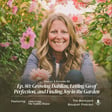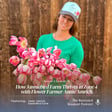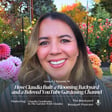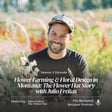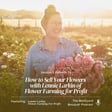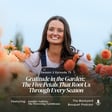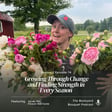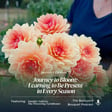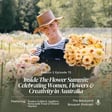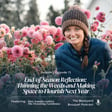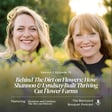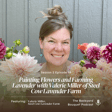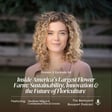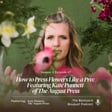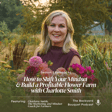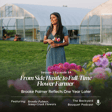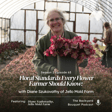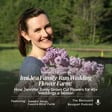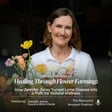
Ep.41: Kelsey Hall: How the 'Daffodahlia' Discovery Is Shaping the Future at Cattle & Cut Flowers Farm
What happens when a dahlia unexpectedly takes on the appearance of a daffodil? In this episode of the Backyard Bouquet Podcast, Kelsey Hall of Cattle & Cut Flowers shares her remarkable journey in flower farming and the intriguing story behind her recent discovery, the “Daffodahlia.”
Kelsey, who runs a charming family-operated farm in Enumclaw, Washington, recounts how her farming adventure began in 2017 when she and her husband purchased a foreclosure property. Initially focused on creating a sustainable homestead with livestock, Kelsey gradually found her passion for flowers, starting with just 30 dahlia plants. Fast forward to today, and she now cultivates over 4,000 dahlias each year, showcasing her dedication and love for floral farming.
During the conversation, Kelsey reveals the fascinating tale of the "Daffodahlia," a unique dahlia sport that emerged unexpectedly in her high tunnel. This striking flower features a daffodil-like shape, captivating flower enthusiasts and even catching the attention of Martha Stewart. Kelsey shares her initial concerns about the mutation, fearing it might indicate a disease, but her journey of discovery leads her to realize the beauty and potential of this extraordinary bloom.
Kelsey shares about her challenges of balancing family life with the demands of farming, as well as her approach to wedding floral design. She discusses her plans to expand her dahlia production while also emphasizing the importance of responsible farming practices and thorough testing before introducing new varieties to the market.
Kelsey’s story is one of passion, resilience, and the magic that can unfold in the world of flower farming. Tune in to hear the full conversation and be inspired by Kelsey’s journey, the beauty of dahlias, and the unexpected surprises that nature can bring!
In This Episode You’ll Hear About:
00:05:30 - Introduction to Kelsey Hall and Cattle and Cup Flowers
00:10:00 - Kelsey's Journey into Flower Farming
00:15:30 - Transitioning from Livestock to Flowers
00:25:30 - Balancing Family Life and Farming
00:30:00 - Sales Outlets and Business Strategies
00:35:30 - The Discovery of the Daffodahlia
00:45:30 - Future Plans for the Daffodahlia
00:50:00 - Dahlia Seed Collection and Pollination
00:55:30 - Growing Zone and Seasonal Changes
Learn More About Cattle & Cut Flowers:
- https://www.cattleandcutflowers.com/
- https://www.instagram.com/cattleandcutflowers/
- https://www.facebook.com/cattleandcutflowers/
Podcast Listens Can Enjoy One-Month Free Subscription To The Dahlia Patch!
Join Here: https://bit.ly/backyardbouquet
Sign up for our newsletter: https://bit.ly/thefloweringfarmhousenewsletter
***Rate, Review, & Follow The Backyard Bouquet***
If you enjoyed this episode, will you please consider leaving the podcast a review? Your review helps make the podcast more discoverable to others and allows me to continue creating more episodes. I'd love to know what you enjoyed most about the episode.
New episodes every week to help keep your garden blooming!
